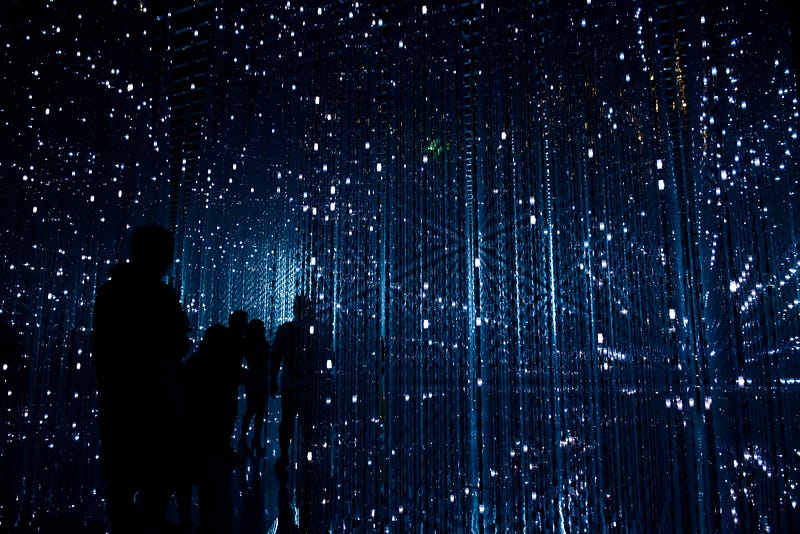Metamodern Futures
Properties and impact of Metamodern Ideas on Futures.

I was starting this article wondering, if I should stick with my usual edutainment style, or if I should tune it up academia-wise, in order to reach a different audience.
Well, you already know, which way I chose.
Metamodernity. Not a known thing currently. Though I claim, as you will see, that we are already in metamodern times. If you identify as such or not, is not the crucial question.
Talking frequently about this topic, I’ve been confronted with a variety of responses (from futures folks and others). Metamodernity was called a lot of things. An engineering project. Too difficult. Needs a lot of cognitive development to embrace the idea.
But for me, Metamodernity is none of that. I am a Metamodernist, and I do not think that I am at an exceptional cognitive developmental stage. I am an engineer by training, yet not interested in engineering projects.
It just feels that this word, this term, this era describes best the notions I have on an everyday basis in my liminal personal reality.
But what is Metamodernism, and why does it have an impact on futures?
As usual — let’s look back to look forward.
Modernism — or rationality wins

First things first. Cultural paradigms are not projects. They do not have defined starting points, milestones along the way, and an ending they are thriving towards.
Cultural paradigms are social kinds and hence process kinds (see Jason Ananda Josephson Storm’s work on those topics).
That implies that cultural paradigms change and adapt along their way of existence. Just like a river, it is flowing from its source until its end, emptying into the space of possibilities.
The river is always there. It was always there, with or without us looking at it. Its name changes. Its aspect changes. But time flows constantly (I knowingly omit the discussion on the need for directionality at this point, but be aware — it might come.)
For the last several hundred years the dominant paradigm was modernism.
Modernism was born out of the so-called “Enlightenment”. It is based on the foundational belief in rationality and science as the only possible way to progress and elevation.
This idea did not come out of nowhere, it was born out of the observation, that spirituality, religion, and the shift of salvation and freedom to the afterlife, did not lead to progress. On the contrary.
As the ancient world of Greeks and Romans was rediscovered, it was seen that science and thinking would support humanity to progress and prosper.
Ideas like democracy, equality, and education for the masses were revived and rolled out.
The strong focus on science paved the way for industrialization and technological progress. This was translated to capitalism in economics.
Humanity prospered. Progress accelerated.
To translate that into futures — meaning how we look into the future — the modern paradigm lens resulted in looking into one future. Utopia — the buzzword of the era.
Utopia — literally translated from the Greek no-place, was used as the future vision where everything is possible for everyone.
Modernism in a nutshell — everything is possible.
Maybe we should add the second part — if you want it enough.
The modern paradigm created the grand narrative that progress is for everyone.
But as it happens with acceleration — there is always someone left behind.
Since modernity emerged out of the Western world and was brought with colonization around the globe — many people were sucked into the river of modernity and asked to leave everything they had behind.
Modern wisdom was thought to be superior to ancient knowledge since it was supposedly built on rational science. And therefore suppressed, in a lot of cases even wiped out the wisdom, rituals, and practices of non-Western cultures.
But not only non-Western cultures were suppressed and therefore left behind. Also within the Western world, voices arose, questioning the grand narratives in place.
Welcome to postmodernism.
Postmodernism — deconstructed Utopias usually end in Dystopia

For sure you have seen one of those science fiction movie, that start in the perfect little town with the perfect little people. Everything seems so in flow, that it is unbelievable. Until you take a closer look. Finding the ugly hidden secrets, pasts, and truths of the people, realizing that in fact, it is a horrible place.
That happened to Utopia when it clashed with Postmodernism.
Let me clear something up here — I am not against Postmodernism or even in critique of its practices.
Postmodernism led to very good changes in our society and world.
Social categories in their absolutism were questioned and deconstructed. What is a man and a woman? Why are social status and possibilities of becoming dependent on sex, race, and gender? Why becoming is superior to being? Why thinking superior to feeling? Why is the Western world dominating practically every aspect of our global lives?
How can individuals find purpose and meaning in a world where traditional narratives and beliefs have been dismantled? Does anything hold intrinsic value when all values are subjected to relentless critique?
And why if rationality and science are the way to a better life for all of us, is there so much pain, suffering, and destruction in our world?
If we know so many things, why do we destroy our home planet, closing our eyes to the consequences, just hoping our optimism bias will be right this time?
This Postmodern deconstruction, with its questioning of established truths and meaning, started an era of profound existential uncertainty.
And in that landscape where certainty is a scarce commodity, finding purpose and meaning is an everyday struggle.
Postmodernity in a nutshell — everything is possible, yet nothing can be done.
To stick with the picture of the river — a new smaller river emerged. Or maybe it is better to look at many small rivers emerging — river bifurcation. Seemingly flowing in a different direction.
So what is the impact on futures?
Metamodern Futures — Collective futures to act on

Modernities Utopia is deconstructed in a collective Dystopia. It was replaced by many individual futures visions, that fragmented groups or even individuals act on.
What that means.
We are in an in-between-world reality without a collective vision.
To stress the picture used — we are in a river delta where distributaries form a complex network of interconnected streams. Some streams dry out on the go, others emerge.
Complexity is a given.
Although there are forces that try to turn their stream around, pretending they are still in a place where there is one river and one future.
We are not anymore in the land of modernity or postmodernity, we reached already metamodernity.
Metamodernity is the idea to embrace complexity as given.
It is the idea to embrace the in-betweenness (Meta from Greek metaxis — in between).
It is the acknowledgment that we are oscillating between becoming and being, between simple and complex, between futures and presence, and between thinking and feeling.
In mathematics, an oscillating function is defined by an infinite number of roots. Just as we humans, we have an infinite number of roots, some of them known, many unknown.
For futures that means to stop trying to build bridges between the here and there. Bridges are for certain moments in the flow only, they do not move with us into what is coming.
Metamodern futures mean to be the rivers and the rain that is feeding them. To invite people to look into the endless sea of possibility the river delta is ultimately pouring into.
Metamodern futures means to teach and learn together with people how to swim and sail, when to pause and build, and when to go with the flow.
Metamodern futures are not the destination — they are the way.
Metamodern futures means understanding, embodying, and distributing that our world is a giant experiment, and it is as much mine as yours. (I recommend here Hanzi Freinachts Listening Society, where this notion is explained more sophisticated)
Metamodernity in a nutshell — everything is possible, nothing matters.
Nothing matters does not refer to standing still and doing nothing. (Although I have to admit it is an eligible option, chosen by many, but just not as much fun as trying.)
Nothing matters refers to doing something will be the right thing on some level, and the wrong thing on another. Because our world is complex and this is how complex systems behave. Whatever you do will have intended and unintended consequences. And that’s okay.
Because consequences mean you did something. You are navigating the river delta. You are actively doing something.
You are creating futures.
Metamodernism — not an academic project

I know, pretty abstract. But it does not have to be.
We all act on our ideas and visions of the futures all day long. Mostly subconsciously, sometimes consciously.
We make plans, sometimes even build strategies to get to some goal we defined for us, our organizations, communities whatever.
But mostly we treat our plans as projects. (Think about it buying a house, project, marrying — project, divorce — project). A lot of self-help out there even treats life itself as project.
Projects are finite games. There is a start and an end and rules and a winner, hence also a loser.
Life itself, but also businesses, organisations communities are not like that. They are adaptable processes. Infinite games. No winner (and no loser for that matter). It is about staying in the game.
If we embrace that idea and use our strategic methods accordingly, we create visions and game rules, that people can individually and collectively act on.
That is what Metamodern futures is about — creating the agency we need.
Inevitable Metamodernity?

I am aware that I present the idea as inevitable and the only way. But well, it isn’t.
Although I strongly feel that we indeed are in Metamodern times, it is not the only possible way forward. As it goes with futures — it will depend on us.
Metamodernism as a way forward requires that the collective embraces the in-betweenness, and that requires one crucial thing — individual self-development. Yet we are still in a fractured world, where, as the famous saying goes, the future is not evenly distributed.
If this requirement is not fulfilled, one possible other way is not Metamodernity but Medimodernity — a revival of middle age based on our newly available technology. (I will not go into detail here, but watch out for an elaborate article on Medimodernity.)
But this is an inherent property of futures. No one knows where we go.
But that should not hinder us to steer and navigate.
Hi, I am Eva Tomas Casado. Futurist by nature, engineer by training, and philosopher by heart. I am an advocate of thinking as our superpower in the in-betweenness of our times. If you want to engage in collective thinking visit my webpage or reach out on LinkedIn.




